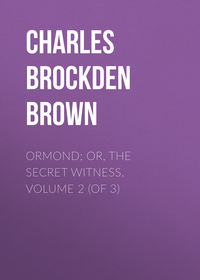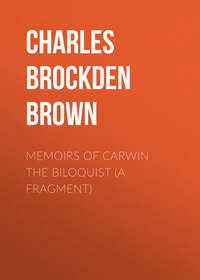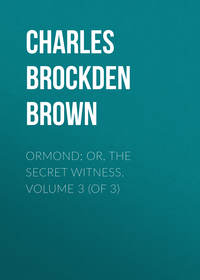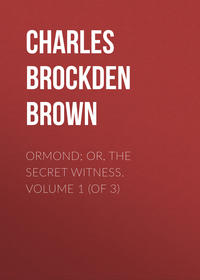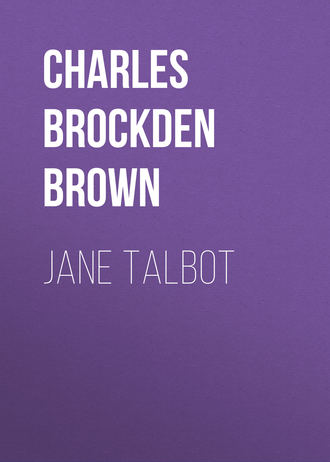 полная версия
полная версияJane Talbot
Farewell; my fervent and disinterested blessings go with you. Return speedily to your country, but bring with you a heart devoted to another, and only glowing with a brotherly affection for
J. T.
Letter LXVI
To Jane TalbotNew York, November 15.
The fear that what I have to communicate may be imparted more abruptly and with false or exaggerated circumstances induces me to write to you.
Yesterday week, a ship arrived in this port from Batavia, in which my husband's brother, Stephen Montford, came passenger.
You will be terrified at these words; but calm your apprehensions. Harry does not accompany him, it is true, nor are we acquainted with his present situation.
The story of their unfortunate voyage cannot be minutely related now. Suffice it to say that a wicked and turbulent wretch, whom they shipped in the West Indies as mate, the former dying on the voyage thither, gave rise, by his intrigues among the crew, to a mutiny.
After a prosperous navigation and some stay at Nootka, they prepared to cross the ocean to Asia. They pursued the usual route of former traders, and, after touching at the Sandwich Islands, they made the land of Japan.
At this period, the mutiny, which had long been hatching, broke out. The whole crew, including the mate, joined the conspiracy. Montford and my brother were the objects of this conspiracy.
The original design was to murder them both and throw their bodies into the sea; but this cruel proposal was thwarted both, by compassion and by policy, and it was resolved to set my brother ashore on the first inhospitable land they should meet, and retain Montford to assist them in the navigation of the vessel, designing to destroy him when his services should no longer be necessary.
This scheme was executed as soon, as they came in sight of an outlying isle or dry sand-bank on the eastern coast of Japan. Here they seized the two unsuspecting youths, at daybreak, while asleep in their berths, and, immediately putting out their boat, landed my brother on the shore, without clothing or provisions of any kind. Montford petitioned to share the fate of his friend, but they would not listen to it.
Six days afterwards, they lighted on a Spanish ship bound to Manilla, which was in want of water. A party of the Spaniards came on board in search of some supply of that necessary article.
On their coming, Montford was driven below and disabled from giving, by his cries, any alarm. The sentinel who guarded him had received orders to keep him in that situation till the visitants had departed. Prom some impulse of humanity, or mistake of orders, the sentinel freed him from restraint a few minutes earlier than had been intended, and he got on deck before the departing strangers had gone to any considerable distance from the ship. He immediately leaped into the sea and made for the boat, to which, being a very vigorous swimmer, he arrived in safety.
The mutineers, finding their victim had escaped, endeavoured to make the best of their way, but were soon overtaken by the Spanish vessel, to whose officers Montford made haste to explain the true state of affairs. They were carried to Manilla, where Montford sold his vessel and cargo on very advantageous terms. From thence, after many delays, he got to Batavia, and from thence returned home.
I have thus given you, my friend, an imperfect account of their misfortunes. I need not add that no tidings has been received, or can reasonably be hoped ever to be received, of my brother.
I could not write on such a subject sooner. For some days I had thoughts of being wholly silent on this news. Indeed, my emotions would not immediately permit me to use the pen; but I have concluded, and it is my husband's earnest advice, to tell you the whole truth.
Be not too much distressed, my sister, my friend. Fain would I give you that consolation which I myself want. I entreat you, let me hear from you soon, and tell me that you are not very much afflicted. Yet I could not believe you if you did. Write to me speedily, however.
Letter LXVII
To Mrs. TalbotNew York, November 23.
You do not write to me, my dear Jane. Why are you silent? Surely you cannot be indifferent to my happiness. You must know how painful, at a moment like this, your silence must prove.
I have waited from day to day in expectation of a letter; but more than a week has passed, and none has come. Let me hear from you immediately, I entreat you.
I am afraid you are ill; or perhaps you are displeased with me. Unconsciously I may have given you offence.
But, indeed, I can easily suspect the cause of your silence. I trembled with terror when I sent you tidings of our calamity. I know the impetuosity of your feelings, and the effects of your present solitude. Would to Heaven you were anywhere but where you are! Would to Heaven you were once more with us!
Let me beseech you to return to us immediately. Mr. M. is anxious to go for you. He wanted to set out immediately on his brother's arrival, and to be the bearer of my letter, but I prevailed on him to forbear until I heard from you.
Do not, if you have any regard for me, delay answering me a moment longer.
M. M.
Letter LXVIII
To Mrs. MontfordBanks of Delaware, November 26.
I beseech you, dear Mrs. Montford, take some measures for drawing our dear Jane from this place. There is no remedy but absence from this spot, cheerful company and amusing engagements, for the sullen grief which has seized her. Ever since the arrival of your letter, giving us the fatal tidings of your brother's misfortune, she has been–in a strange way–I am almost afraid to tell you. I know how much you love her; but, indeed, indeed, unless somebody with more spirit and skill than I possess will undertake to console and divert her, I am fearful we shall lose her forever.
I can do nothing for her relief. You know what a poor creature I am. Instead of summoning up courage to assist another in distress, the sight of it confuses and frightens me. Never, I believe, was there such another helpless, good-for-nothing creature in existence. Poor Jane's affecting ways only make me miserable; and, instead of my being of any use to her, her presence deprives me of all power to attend to my family and friends. I endeavour to avoid her, though, indeed, that requires but little pains to effect, since she will not be seen but when she cannot choose; for whenever she looks at me steadily there is such expression in her features, something so woeful, so wild, that I am struck with terror. It never fails to make me cry heartily.
Come hither yourself, or send somebody immediately. If you do not, I dread the consequence.
Letter LXIX
To Mr. MontfordNew Haven, February 10.
My dear friend:–
This letter is written in extreme pain; yet no pain that I ever felt, no external pain possible for me to feel, is equal to the torment I derive from suspense. Good Heaven! what an untoward accident! to be forcibly immured in a tavern-chamber; when the distance is so small between me and that certainty after which my soul pants!
I ought not thus to alarm my beloved friends, but I know not what I write: my head is in confusion, my heart in tumults; a delirium, more the effect of a mind stretched upon the rack of impatience than of limbs shattered and broken, whirls me out of myself.
Not a moment of undisturbed repose have I enjoyed for the last two months. If awake, omens and conjectures, menacing fears, and half-formed hopes, have haunted and harassed me. If asleep, dreams of agonizing forms and ever-varying hues have thronged my fancy and driven away peace.
In less than an hour after landing at Boston, I placed myself in the swiftest stage, and have travelled night and day, till within a mile of this town, when the carriage was overturned and my left arm terribly shattered. I was drawn with difficulty hither; and my only hope of being once more well is founded on my continuance, for I know not how long, in one spot and one posture.
By this time, the well-known hand has told you who it is that writes this:–the exile; the fugitive; whom four long years of absence and silence have not, I hope, erased from your remembrance, banished from your love, or even totally excluded from the hope of being seen again.
Yet that hope, surely, must have been long ago dismissed. Acquainted as you are with some part of my destiny; of my being left on the desert shore of Japan; on the borders of a new world,–a world civilized indeed, and peopled by men, but existing in almost total separation from the other families of mankind; with language, manners, and policy almost incompatible with the existence of a stranger among them; all entrance or egress from which being commonly supposed to be prohibited by iron laws and inflexible despotism; that I, a stranger, naked, forlorn, cast upon a sandy beach frequented but at rare intervals and by savage fishermen, should find my way into the heart of this wonderful empire, and finally explore my way back to my native shore, are surely most strange and incredible achievements. Yet all this, my friend, has been endured and performed by your Colden.
Finding it impossible to move immediately from this place, and this day's post having gone out before my arrival, I employed a man to carry you these assurances of my existence and return, and to bring me back intelligence of your welfare; and some news concerning–may I perish if I can, at this moment, write her name! Every moment, every mile that has brought me nearer to her, or rather nearer to certainty of her life or death, her happiness or misery, has increased my trepidation,–added new tremors to my heart.
I have some time to spare. In spite of my impatience, my messenger cannot start within a few hours. I am little fitted, in my present state of pain and suspense, to write intelligibly. Yet what else can I do but write? and will you not, in your turn, be impatient to know by what means I have once more set my foot in my native land?
I will fill up the interval, till my messenger is ready, by writing. I will give you some hints of my adventures. All particulars must be deferred till I see you. Heaven grant that I may once more see you and my sister! Four months ago you were well, but that interval is large enough to breathe ten thousand disasters. Expect not a distinct or regular story. That, I repeat, must be deferred till we meet. Many a long day would be consumed in the telling; and that which was hazard or hardship in the encounter and the sufferance will be pleasant to remembrance and delightful in narration.
This person's name was Holtz. He was the agent of the Dutch East India Company in Japan. He was then at court in a sort of diplomatic character. He was likewise a physician and man of science. He had even been in America, and found no difficulty in conversing with me in my native language.
You will easily imagine the surprise and pleasure which such a meeting afforded me. It likewise opened a door to my return to Europe, as a large trade is regularly maintained between Java and Japan.
Many obstacles, however, in the views which Tekehatsin had formed, of profit and amusement, from my remaining in his service, and in the personal interests and wishes of my friend Holtz, opposed this design; nor was I able to accomplish it, but on condition of returning.
I confess to you, my friend, my heart was not extremely averse to this condition.
I left America with very faint hopes, and no expectation, of ever returning. The longer I resided among this race of men, the melancholy and forlornness of my feelings declined. Prospects of satisfaction from the novelty and grandeur of the scene into which I had entered began to open upon me; sentiments of affection and gratitude for Holtz, and even for the Japanese lord, took root in my heart. Still, however, happiness was bound to scenes and to persons very distant from, my new country, and a restlessness forever haunted me, which nothing could appease but some direct intelligence from you and from Jane Talbot. By returning to Europe, I could likewise be of essential service to Holtz, whose family were Saxons, and whose commercial interests required the presence of a trusty agent for a few months at Hamburg.
Let me carry you, in few words, through the difficulties of my embarkation, and the incidents of a short stay at Batavia, and a long voyage over half the world to Hamburg.
Shortly after my return to Hamburg, from an excursion into Saxony to see Holtz's friends, I met with Mr. Cartwright, an American. After much fluctuation, I had previously resolved to content myself with writing to you, of whom I received such verbal information from several of our countrymen as removed my anxiety on your account. A very plausible tale, told me by some one that pretended to know, of Mrs. Talbot's marriage with a Mr. Cartwright, extinguished every new-born wish to revisit my native land, and I expected to set sail on my return to India, before it could be possible to hear from you.
I was on the eve of my departure, when the name of Cartwright, an American, then at Hamburg, reached my ears. The similarity of his name to that of the happy man who had supplanted the poor wanderer in the affections of Jane, and a suspicion that they might possibly be akin, and, consequently, that this might afford me some information as to the character or merits of that Cartwright, made me throw myself in his way.
You may easily imagine, what I shall defer relating, the steps which led us to a knowledge of each other, and by which I discovered that this Cartwright was the one mentioned to me, and that, instead of being already the husband of my Jane, his hopes of her favour depended on the certain proof of my death.
Cartwright's behaviour was in the highest degree disinterested. He might easily have left me in my original error, and a very few days would have sent me on a voyage which would have been equivalent to my death. On the contrary, his voluntary information, and a letter which he showed me, written in Jane's hand, created a new soul in my breast. Every foreign object vanished, and every ancient sentiment, connected with our unfortunate loves, was instantly revived. Ineffable tenderness, and an impatience next to rage to see her, reigned in my heart.
Yet, my friend, with all my confidence of a favourable reception from Jane,–her conduct now exempt from the irresistible control of her mother, and her tenderness for me as fervent as ever,–yet, since so excellent a man as Cartwright existed, since his claims were, in truth, antecedent to mine, since my death or everlasting absence would finally insure success to these claims, since his character was blemished by none of those momentous errors with which mine was loaded, since that harmony of opinion on religious subjects, without which marriage can never be a source of happiness to hearts touched by a true and immortal passion, was perfect in his case,–never should mere passion have seduced me to her feet. If my reflections and experience had not changed my character,–if all her views as to the final destiny and present obligations of human beings had not become mine,–I should have deliberately ratified the act of my eternal banishment.
Yes, my friend; this weather-beaten form and sunburnt face are not more unlike what you once knew, than my habits and opinions now and formerly. The incidents of a long voyage, the vicissitudes through which I have passed, have given strength to my frame, while the opportunities and occasions for wisdom which these have afforded me have made my mind whole. I have awakened from my dreams of doubt and misery, not to the cold and vague belief, but to the living and delightful consciousness, of every tie that can bind man to his Divine Parent and Judge.
Again I must refer you to our future interviews. A broken and obscure tale it would be which I could now relate. I am hurried, by my fears and suspenses–Yet it would give you pleasure to know every thing as soon as possible–some time likewise must elapse–You and my sister have always been wise. The lessons of true piety it is the business of your lives to exemplify and to teach. Henceforth, if that principle, which has been my stay and my comfort in all the slippery paths and unlooked-for perils from which I have just been delivered, desert not my future steps, I hope to be no mean example and no feeble teacher of the same lessons. Indefatigable zeal and strenuous efforts are indeed incumbent on me in proportion to the extent of my past misconduct and the depth of my former degeneracy.
By what process of reflection I became thus, you shall speedily know: yet can you be at a loss to imagine it? You, who have passed through somewhat similar changes; who always made allowances for the temerity of youth, the fascinations of novelty; who always predicted that a few more years, the events of my peculiar destiny, the leisure of my long voyage, and that goodness of intention to which you were ever kind enough to admit my claims, would ultimately provide the remedy for all errors and evils, and make me worthy of the undivided love of all good men,–you, who have had this experience, and who have always regarded me in this light, will not wonder that reflection has, at length, raised me to the tranquil and steadfast height of simple and true piety.
Such, my friend, were my inducements to return; but first it was necessary to explain, by letter, to Holtz–But my messenger is at the door, eager to begone. Take this, my friend. Bring yourself, or send back by the same messenger, without a moment's delay, tidings of her, and of your safety. As to me, be not much concerned on my account. I am solemnly assured by my surgeon that nothing but time and a tranquil mind are necessary to restore me to health. The last boon no hand but yours can confer on your
H. COLDEN.
Letter LXX
To Henry GoldenNew York, February 12.
And are you then alive? Are you then returned? Still do you remember, still love, the ungrateful and capricious Jane? Have you indeed come back to soothe her almost broken heart,–to rescue her from the grave,–to cheer her with the prospect of peaceful and bright days yet to come?
Oh, my full heart! Sorrow has not hitherto been able quite to burst this frail tenement. I almost fear that joy,–so strange to me is joy, and so far, so very far, beyond my notions of possibility was your return,–I almost fear that joy will do what sorrow was unable to do.
Can it be that Golden–that selfsame, dear, pensive face, those eyes, benignly and sweetly mild, and that heart-dissolving voice, have escaped so many storms, so many dangers? Was it love for me that led you from the extremity of the world? and have you, indeed, brought back with you a heart full of "ineffable tenderness" for me?
Unspeakably unworthy am I of your love. Time and grief, dear Hal, have bereft me of the glossy hues, the laughing graces, which your doting judgment once ascribed to me. But what will not the joy of your return effect? I already feel lightsome and buoyant as a bird. My head is giddy; but, alas, you are not well,–yet, you assure us, not dangerously sick. Nothing, did you not say, but time and repose necessary to heal you? Will not my presence, my nursing, hasten thy restoration? Tuesday evening–they say it can't possibly be sooner–I am with you. No supporters shall you have but my arms; no pillow but my breast. Every holy rite shall instantly be called in to make us one. And when once united, nothing but death shall ever part us again. What did I say? Death itself–at least thy death–shall never dissever that bond.
Your brother will take this. Your sister–she is the most excellent of women, and worthy to be your sister–she and I will follow him to-morrow. He will tell you much which my hurried spirits will not allow me to tell you in this letter. He knows everything. He has been a brother since my mother's death. She is dead, Henry. She died in my arms; and will it not give you pleasure to know that her dying lips blessed me, and expressed the hope that you would one day return to find, in my authorized love, some recompense for all the evils to which her antipathies subjected you? She hoped, indeed, that observation and experience would detect the fallacy of your former tenets; that you would become wise, not in speculation only, but in practice, and be, in every respect, deserving of the happiness and honour which would attend the gift of her daughter's hand and heart.
My words cannot utter, but thy own heart perhaps can conceive, the rapture which thy confession of a change in thy opinions has afforded me. All my prayers, Henry, have not been merely for your return. Indeed, whatever might have been the dictates, however absolute the dominion, of passion, union with you would have been very far from completing my felicity, unless our hopes and opinions, as well as our persons and hearts, were united. Now can I look up with confidence and exultation to the shade of my revered and beloved mother. Now can I safely invoke her presence and her blessing on a union which death will have no power to dissolve. Oh, what sweet peace, what serene transport, is there in the persuasion that the selected soul will continue forever to commune with my soul, mingle with mine in its adoration of the same Divine Parent, and partake with me in every thought, in every emotion, both here and hereafter!
Never, my friend, without this persuasion, never should I have known one moment of true happiness. Marriage, indeed, instead of losing its attractions in consequence of your errors, drew thence only new recommendations, since with a zeal, a tenderness, and a faith like mine, my efforts to restore such a heart and such a reason as yours could not fail of success; but till that restoration were accomplished, never, I repeat, should I have tasted repose even in your arms.
Poor Miss Jessup! She is dead, Henry,–yet not before she did thee and me poor justice. Her death-bed confession removed my mother's fatal suspicions. This confession and the perusal of all thy letters, and thy exile, which I afterwards discovered was known to her very early, though unsuspected by me till after her decease, brought her to regard thee with some compassion and some respect.
I can write no more; but must not conclude till I have offered thee the tenderest, most fervent vows of a heart that ever was and always will be thine own. Witness,
JANE TALBOT.
The End

